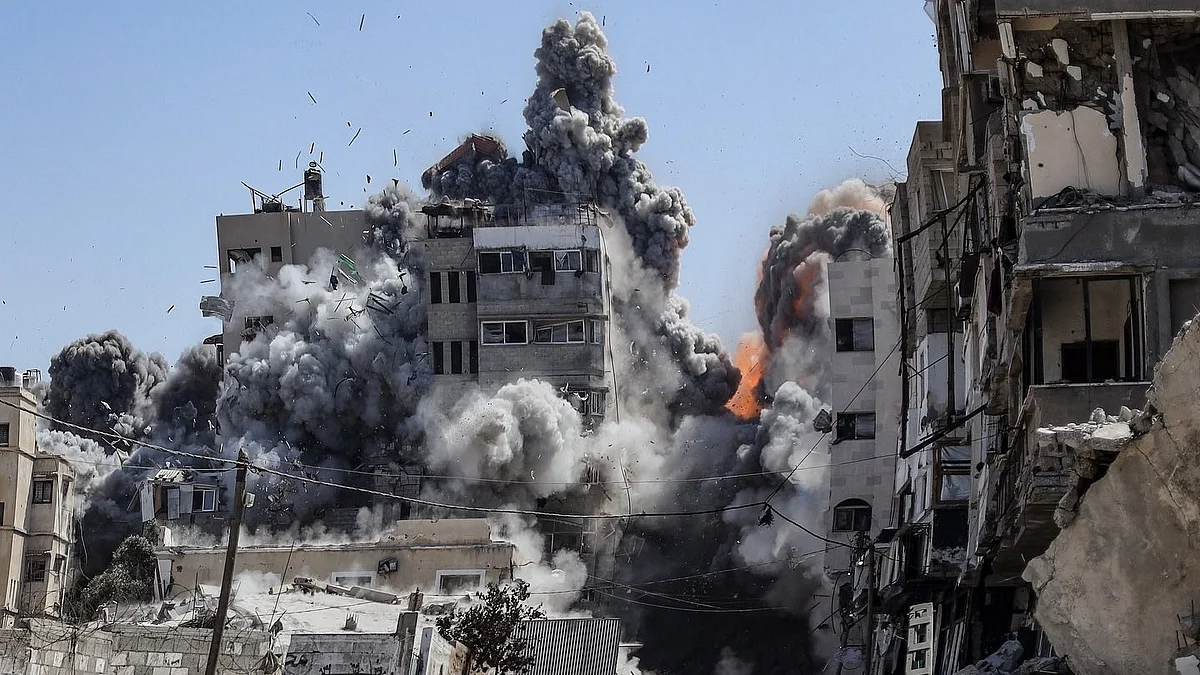Gaza: World uniting for peace, finally, but negotiations remain fragile
UK foreign secy Yvette Cooper sounded hopeful, but warned challenges remain, with Israel refusing to halt its offensive despite the deepening humanitarian crisis

Yvette Cooper has said the world may be nearing a peace agreement for Gaza that could end two years of conflict and humanitarian disaster, suggesting international resolve is at a turning point. The newly appointed UK foreign secretary, just back from the recent UN summit, said: “We’ve reached a moment where the world wants to end this war,” referencing US president Donald Trump’s statement that a deal may be close.
In an interview with The Guardian ahead of a Labour Party conference in Liverpool, Cooper urged Israel to "urgently change course" from its renewed offensive in Gaza. But Israeli prime minister Benjamin Netanyahu told the UN his country "must finish the job".
Despite pressure from within Labour to declare Israel's actions as genocide, Cooper stuck to the government's official line, saying that such a determination must be made through legal channels.
She acknowledged the dire state of the humanitarian crisis, saying "words seem hollow" in the face of the suffering, particularly that of Palestinian children, and stressed the need to seize on new diplomatic momentum to end their "screams and pain".
Cooper, believed to have been among cabinet members pushing Keir Starmer to recognise a Palestinian state, said that while she understood the emotional response to the situation in Gaza, her focus had to be on achieving an end to the war.
Also Read: The charade of ‘recognition’ for Palestine
US-led plan for Gaza gathers international support
The White House is meanwhile reported to be backing a 21-point peace proposal that would see former UK prime minister Tony Blair head a temporary technocratic administration in Gaza. Cooper declined twice to say whether Blair was the right person to lead the transitional body.
While Blair has maintained links with Gulf states since serving as a Middle East envoy and has access to the Trump administration through Jared Kushner — Trump’s son-in-law and the plan’s chief architect — he remains divisive in the region due to his involvement in the Iraq War.
“I feel like there is a consensus, a real, huge consensus building, and there was real energy and determination [at the UN] around peace. I think we’ve reached a moment where the world wants to end this war,” said Cooper.
She said the first steps must include a ceasefire, renewed humanitarian access, and the release of all hostages, though she admitted the process is still fragile and beset with difficulties.
“We can’t pretend this isn’t incredibly hard, and how long the crisis has been going on makes it challenging. But there was no doubt that there is a real sense of determination and energy behind trying to get an end to the war and to try and get not just an immediate ceasefire, but a proper plan for the future.”
Just days ahead of hosting Netanyahu in Washington, Trump told reporters: “It was looking like we have a deal on Gaza.”
Cooper recognised the critical role the US president would play in persuading Israel to engage with the process.
Diplomats have said the Trump plan aligns closely with the UN-endorsed framework for Palestine, agreeing on no forced displacement from Gaza, no involvement of Hamas, and no annexation of the West Bank.
However, some in the Foreign Office are said to be uneasy about elements of the Trump plan, particularly Blair’s prospective role.
“Tony Blair has been one of the people adding proposals to this process, and that’s been really important, but there have been lots of other processes as well,” said Cooper.
“There’s still a huge amount of work to do. At this stage, there’s a sense of consensus building but we’ve got to keep that on track.”
Calls for change in Israeli strategy
Cooper noted that Palestinian president Mahmoud Abbas was the last leader she met before stepping down as shadow foreign secretary in 2011, and the first she met upon becoming foreign secretary this month.
She has not yet met Netanyahu but was in New York during his UN appearance. “There is no military solution to this that works,” she said.
“There is no way that the security of Israel is remotely strengthened by this further Gaza City offensive.”
“For security for Israelis, as well as security for Palestinians and as well as dealing with this devastating humanitarian crisis, I think the Israeli government urgently needs to change course.”
The UK Foreign Office regularly assesses the risk of genocide in Gaza, but earlier this month concluded that the threshold had not been met.
“Every time we talk about whether it’s humanitarian crisis or whatever words that we use actually feel hollow, because what it’s really about is the screams and pain of a toddler, and that’s what’s really at the heart of this, and that’s what has to end. The war has to be brought to an end,” said Cooper.
“I think the reason that there is just such a sense of distress is because everybody can see the horror of what has happened and the fact that it feels like nothing’s being done. It feels like nothing is changing. It feels like everything is just getting worse," she commented.
“The challenge for us now is that there is a moment, and we have to make sure that that moment, through international action, is turned into a peace process," the foreign secretary added.
Follow us on: Facebook, Twitter, Google News, Instagram
Join our official telegram channel (@nationalherald) and stay updated with the latest headlines
